Self-Host Your Smart Home: 11 Free Automation Systems Compatible with Raspberry Pi
Table of Content
As the concept of smart homes has transitioned from a futuristic idea to a practical reality for many homeowners.
A smart home integrates various devices and systems to enhance convenience, efficiency, and security, allowing homeowners to control everything from lighting and heating to security systems and appliances—all through a single interface.
These smart home systems enable automation, meaning they can perform tasks automatically based on pre-set schedules, triggers, or even voice commands, providing users with a seamless living experience.
Home automation is at the heart of this smart home revolution. It involves the use of technology to control and monitor household activities, often through the internet.
Imagine coming home to a well-lit, climate-controlled environment with your favorite music playing, all set to happen as soon as you walk through the door.
This level of comfort and efficiency is made possible through smart home devices and automation systems.
One of the most popular platforms for creating a smart home is the Raspberry Pi, a versatile and affordable single-board computer.
DIY enthusiasts and tech-savvy individuals have embraced the Raspberry Pi for its flexibility, allowing users to build custom home automation solutions tailored to their specific needs.
From controlling lights and appliances to setting up security cameras and sensors, the possibilities are endless.
By combining Raspberry Pi with various software platforms and sensors, you can create a fully integrated smart home system that enhances your quality of life while being mindful of your budget.
In the following the best open-source smart home automation systems.
1- OpenHAB
OpenHAB (Open Home Automation Bus) is an open-source home automation platform designed to integrate various smart home devices and technologies into a unified system.
It provides a flexible and extensible framework that allows users to control their home automation systems, monitor devices, and create automation rules.
OpenHAB provides a robust solution for anyone looking to create a smart home environment, allowing for seamless integration and management of diverse smart devices.
Key Features:
- Device Compatibility: Supports a wide range of devices and technologies, including Z-Wave, Zigbee, MQTT, and more.
- Cross-Platform: Runs on various platforms, including Windows, macOS, Linux, and Raspberry Pi.
- Modular Architecture: Built on a modular architecture that allows users to add functionality through add-ons and extensions.
- Web-Based User Interface: Provides a web-based UI for monitoring and controlling devices, accessible from any browser.
- Rules Engine: Features a powerful rules engine that enables users to create complex automation scenarios.
- Voice Control: Integrates with voice assistants like Amazon Alexa and Google Assistant for voice command capabilities.
- Mobile App: Offers mobile applications for Android and iOS for remote access and control.
- Data Visualization: Supports data visualization and analytics for monitoring device performance and usage.
- Community Support: Active community support with extensive documentation and forums for troubleshooting and advice.
- Security: Focuses on security with features like user authentication and secure communication protocols.
2- Wirehome.Core
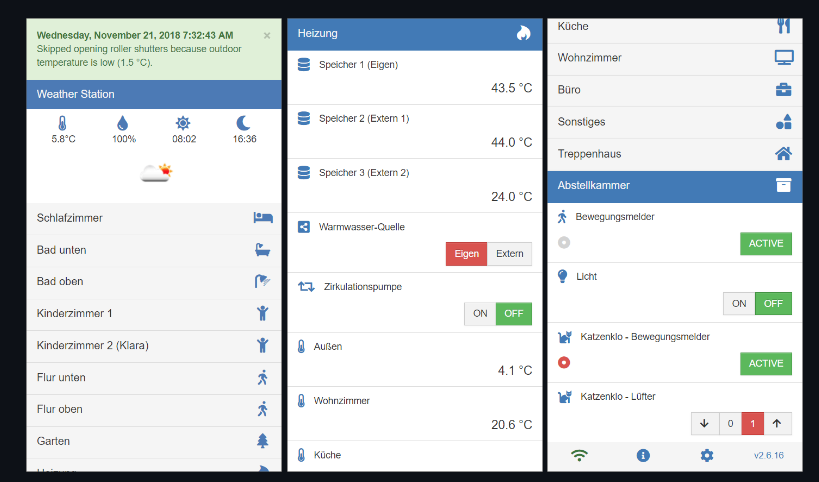
Wirehome.Core is a free and open-source home automation system built on .NET Core, designed to run on various platforms, including Windows, macOS, Linux, & Raspberry Pi.
The core app is written in C#, it targets .NET Standard 2.0+, providing a robust framework for home automation enthusiasts.
Wirehome.Core offers a flexible and powerful solution for home automation, making it easy to integrate and manage various smart devices.
Features
- Cross-Platform Support: Compatible with Windows, macOS, and Linux systems, enabling flexibility in deployment.
- Modular Architecture: Utilizes adapters written in Python for hardware interaction, allowing easy integration with a variety of home automation devices.
- IronPython Integration: Python adapters run on IronPython, providing access to a wide range of functionalities via the Wirehome API.
- Diverse Protocol Support: Supports multiple communication protocols, including GPIO, I2C, MQTT, HTTP, and COAP for device connectivity.
- Built-in MQTT Broker: Includes a fully-featured MQTT broker for reliable messaging between devices.
- HTTP Server: Hosts user content and enables interaction with devices through an integrated HTTP server.
- Custom Automations: Allows users to create custom automations and services using Python scripts.
- Weather Integration: Features integration with Open Weather Map, providing weather data for automation scenarios.
- Version Updates: Distributes updates and additional resources through an official Wirehome repository.
3- Home Assistant
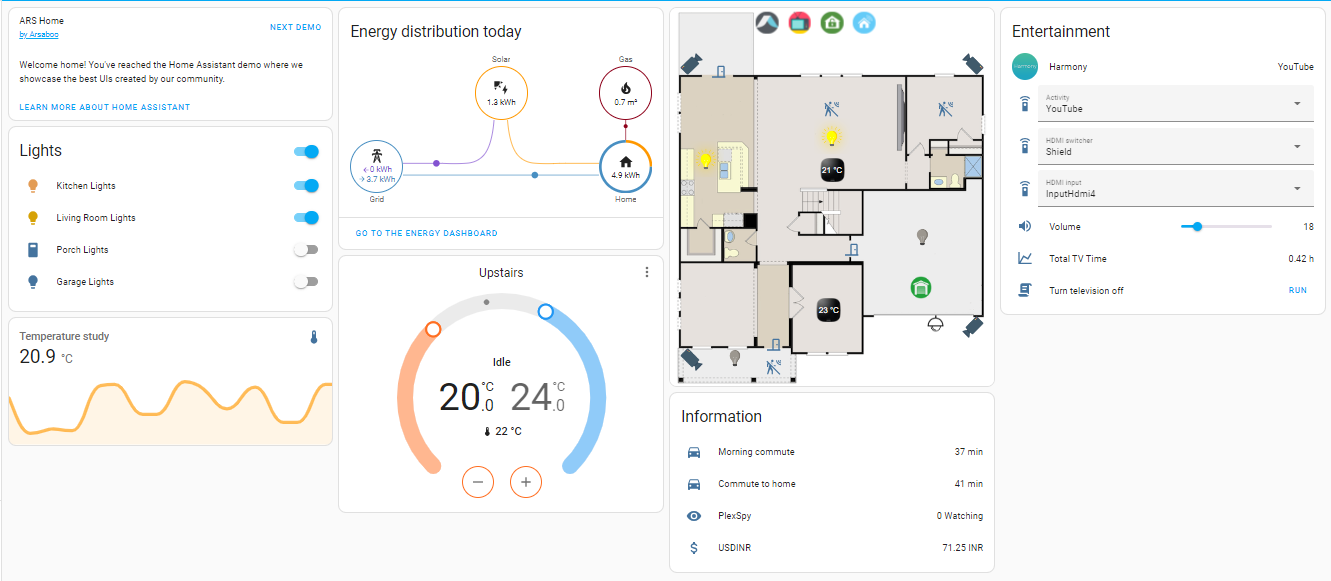
Home Assistant is a widely popular, open-source home automation platform that prioritizes local control and privacy. It is powered by a global community of tinkerers and DIY enthusiasts, making it the perfect solution for running on a Raspberry Pi or a local server.
It can easily integrate with dozens of smart home apps, solutions and systems.
Domoticz
Domoticz is a versatile home automation system that enables users to monitor and configure a wide range of devices, including lights, switches, and various sensors for temperature, rain, wind, UV, electricity, gas, and water. The system supports multi-platform functionality, running on Linux, Windows, and embedded devices.
Domoticz features a scalable HTML5 web interface that adapts seamlessly to desktop and mobile devices, ensuring compatibility with all modern browsers.
Users can receive notifications and alerts on any mobile device, enhancing the convenience of home automation management.
4- Gladys Assistant
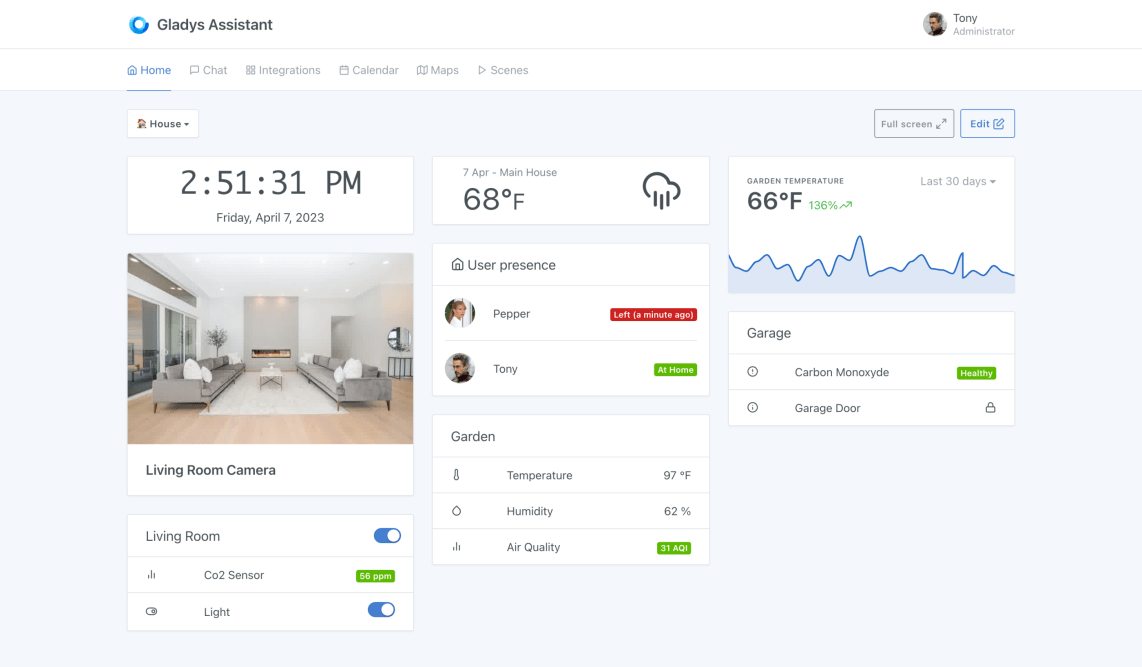
Gladys is an open-source home automation platform designed to enhance smart home management by providing users with a powerful and flexible interface. It allows seamless integration with various devices and services, making home automation accessible and user-friendly.
Features
- Multi-Protocol Support: Integrates with Z-Wave, Zigbee, MQTT, and more.
- Voice Control: Control your home automation system using voice commands.
- Dashboard: User-friendly web dashboard for monitoring and controlling devices.
- Scene Management: Create and manage custom scenes for different environments or activities.
- Notifications: Receive alerts and notifications for events and updates.
- Home Security: Monitor security cameras and receive alerts for unauthorized access.
- Compatibility: Works with various smart home devices from different manufacturers.
- Open Source: Fully open-source platform with a community-driven approach.
- Custom Scripts: Allows users to write and execute custom scripts for advanced automation.
- User Management: Supports multiple user accounts with configurable permissions.
- Mobile App: Access your home automation system via a dedicated mobile app.
- Regular Updates: Active development and regular updates to enhance features and security.
5- MajorDoMo

MajorDoMo (Major Domestic Module) is an open-source DIY smart home automation platform designed for use with multiple protocols and services.
The app is built on a web technology stack, it works on any modern device and offers flexible configuration through an object-oriented programming (OOP) approach for setting up automation rules and scripts.
You can install MajorDoMo on almost any personal computer running Windows or Linux.
Features
- Multi-Protocol Support: Compatible with various protocols for seamless device integration.
- Web-Based Interface: Access and control your smart home from any device with a web browser.
- Cross-Platform Compatibility: Installable on Windows and Linux operating systems.
- Flexible Configuration: Easily configure devices and settings using an intuitive interface.
- Object-Oriented Programming (OOP): Set up automation rules and scripts with an OOP approach for greater flexibility.
- Mobile-Friendly: Optimized for use on smartphones and tablets.
- Customizable Dashboard: Create a personalized dashboard to monitor and control your devices.
- Notifications and Alerts: Receive real-time alerts and notifications for events and device statuses.
- Multi-User Support: Allow multiple users to access and control the smart home system.
- Plugin Architecture: Extend functionality with various plugins for additional services and devices.
- Energy Monitoring: Track and manage energy consumption of connected devices.
- Community Support: Engage with a community of users for tips, support, and sharing of automation scripts.
6- Freedomotic Open IoT Framework
Freedomotic is a self-hosted open source, flexible, secure Internet of Things (IoT) application framework, useful to build and manage modern smart spaces. It is targeted to private individuals (home automation) as well as business users (smart retail environments, ambient aware marketing, monitoring and analytics, ...)
Freedomotic can run also on Raspberry Pi and can easily interact with DIY Arduino projects.
It is ideal for anyone who wanna build a home automation system.
7- HomeGenie
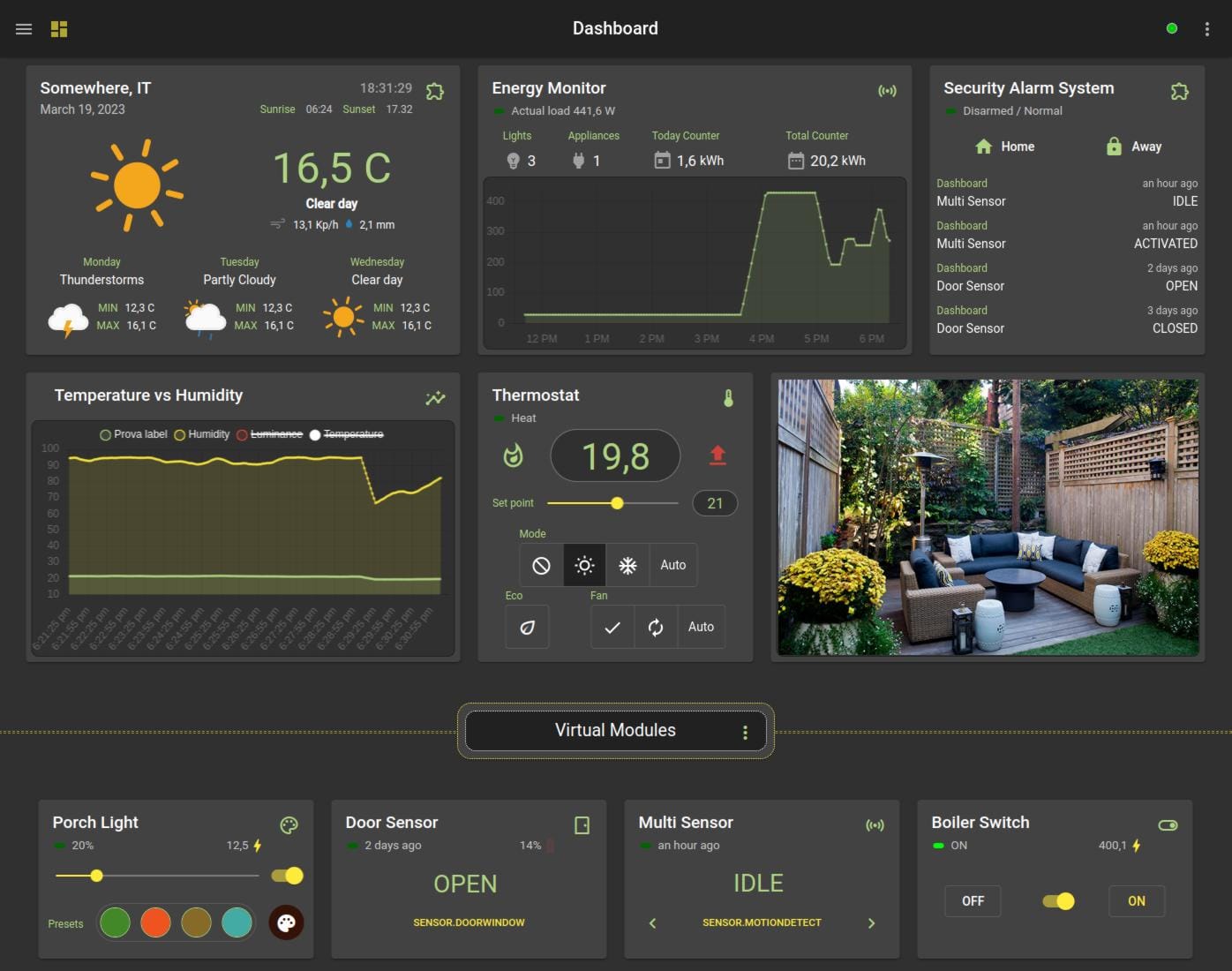
HomeGenie is a free open-source home automation platform designed for flexibility and control. It allows users to automate various tasks and integrate devices from multiple protocols without relying on external cloud services.
With a user-friendly interface and powerful scripting capabilities, HomeGenie provides an effective solution for smart home management.
Features
- Custom Dashboards: Users can create dashboards and group devices, facilitating easy management and monitoring.
- Configuration Backup: Provides options for configuration backups and package repositories for easy restoration and updates.
- Responsive UI: A modern user interface that works seamlessly on both desktop and mobile devices, suitable for fixed control panels.
- Visual Programming Workspace: Allows users to create automation scenarios intuitively without needing coding skills.
- Customizable Client Configurations
- Integrated Drivers: Supports multiple protocols including X10, ZigBee, Z-Wave, GPIO, SPI, and I2C for seamless device integration.
- Offline Functionality: Operates completely offline, ensuring privacy and reliability without dependency on external cloud services.
- Scripting Engine: Programmable using C#, JavaScript, or Python, offering a fluent API for advanced users.
- Advanced Scheduler: Features a scheduling service that supports extended cron expressions, including variables, conditions, and logical operators.
- Voice and Text Control: Enables control of devices through voice commands and text messages for added convenience.
- Localization: Offers support for multiple languages, making it accessible to users worldwide.
8- Jeedom
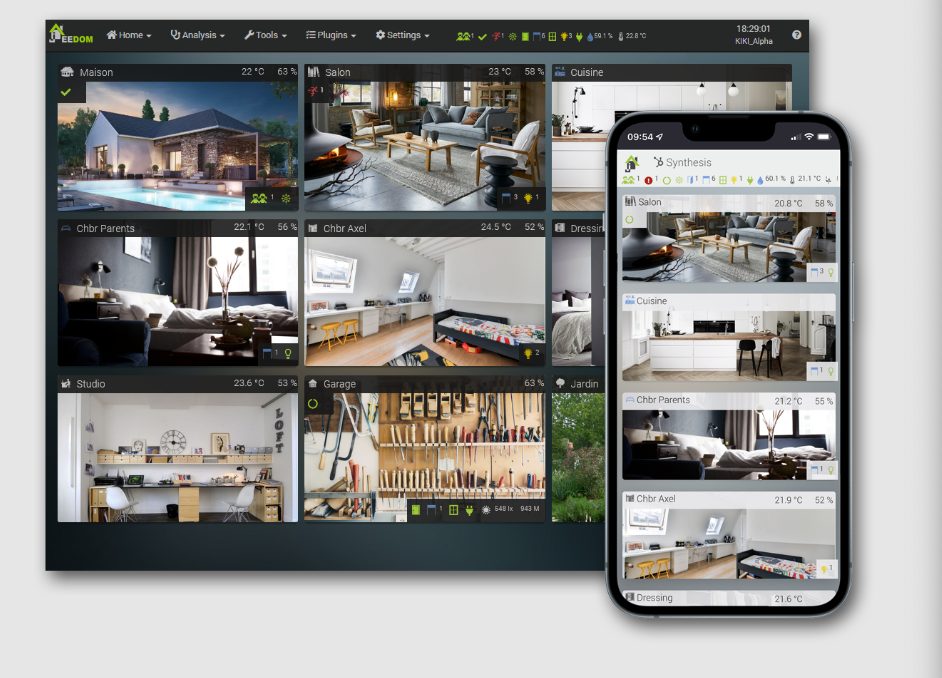
Jeedom is an open-source home automation platform that allows users to manage and control various smart devices from a centralized interface. Designed for flexibility and scalability, Jeedom supports a wide range of protocols, making it a versatile choice for any smart home setup.
Features
- User-Friendly Interface: Intuitive dashboard for easy access and control of connected devices.
- Automation Rules: Create customized scenarios and automation rules to enhance home functionality.
- Voice Control: Integrate with voice assistants for hands-free operation.
- Mobile App: Access and control your smart home from anywhere using the mobile app.
- Plugins System: Extend functionality with a wide range of available plugins.
- Web-Based Access: Manage your system via a web browser on any device.
- Scheduled Actions: Set up timers and schedules for device automation.
- Notifications: Receive alerts and notifications for events and system status.
9- Bear Stone Smart Home
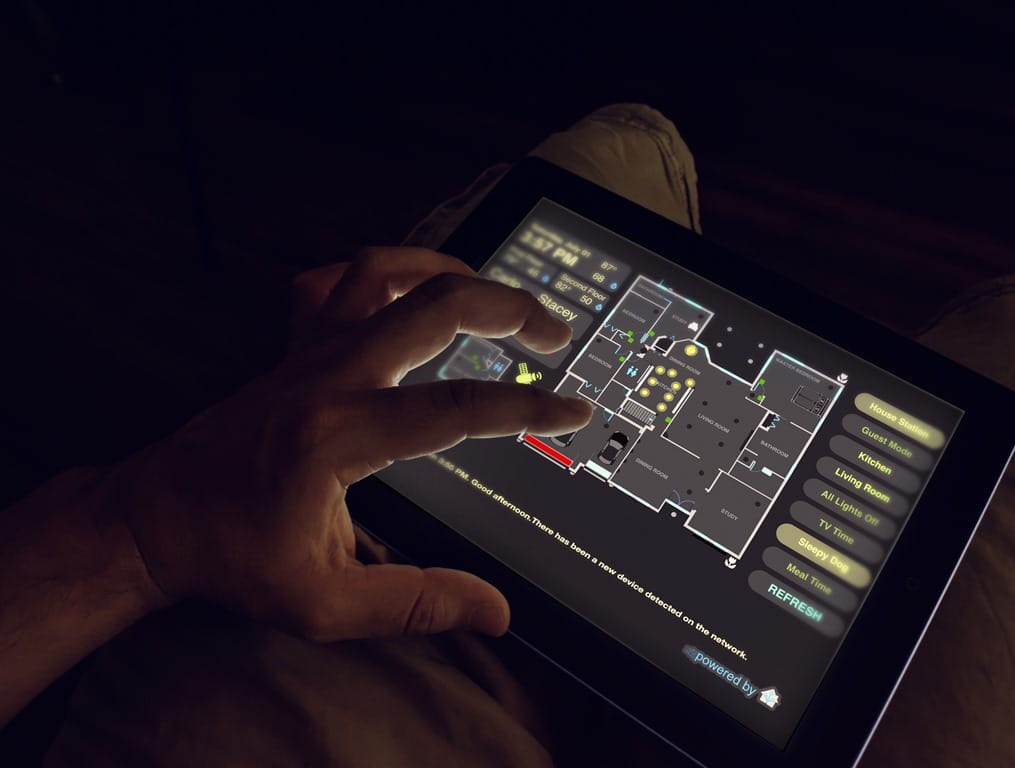
The Home Assistant Config project by CCOSTAN is a user-friendly Docker-based configuration repository designed to simplify and enhance the setup of Home Assistant, an open-source home automation platform.
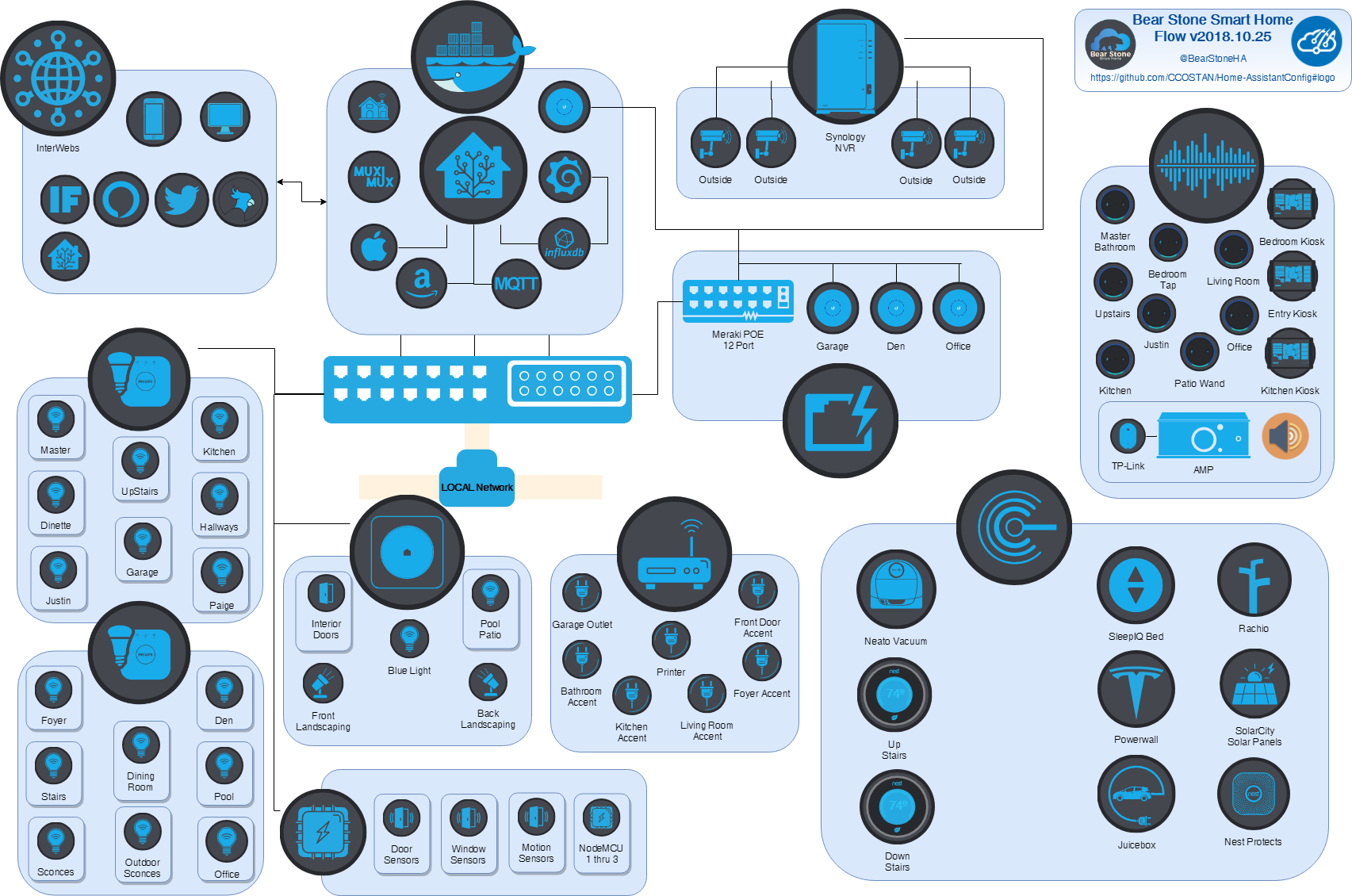
This project provides a well-organized structure for configuration files and automations, making it easier for users to customize their smart home experience.
Features
- Modular Configuration: Organized directory structure for easy management and scalability of configurations.
- Automation Templates: Ready-to-use automation templates for common smart home scenarios.
- Custom Scripts: Provides pre-written scripts to automate various tasks and simplify setup.
- Detailed Documentation: Comprehensive guides and explanations for easy understanding and implementation.
- Version Control: Uses Git for version control, allowing users to track changes and revert to previous configurations.
- Community Contributions: Encourages collaboration, allowing users to contribute their customizations and improvements.
- Rich Visualization: Integrates with Lovelace UI for a visually appealing and customizable dashboard.
- Device Tracking: Includes device trackers to monitor the presence and status of connected devices.
- Sensor Integrations: Supports a wide range of sensors, enhancing automation capabilities.
- Backup Ready: Easy backup and restore options for your Home Assistant setup.
10- RaspberryMatic
RaspberryMatic is a free, open-source operating system designed to serve as a cloud-free IoT hub for managing Homematic and HomematicIP devices, developed by eQ-3 and distributed by ELV. This DIY solution aims to be fully compatible with the vendor-developed HomeMatic CCU3 control center, providing users with a seamless transition to an alternative platform.
RaspberryMatic can be easily installed on various hardware, including the CCU3 and ELV Charly devices, as well as popular single-board computers like Raspberry Pi, ASUS Tinkerboard, and Hardkernel ODROID.
It also supports full-fledged platforms like Intel NUC and can be run as a virtual appliance in environments such as Proxmox VE, VirtualBox, Docker, and VMware.
Features
- Full Compatibility: 100% compatible with Homematic and homematicIP devices, including CCU2 and CCU3.
- Flexible Deployment: Installable on various hardware platforms, including Raspberry Pi, Intel NUC, and virtual appliances.
- WebUI Enhancements: Offers a modern and user-friendly web interface with additional features and improvements.
- Cloud-Free Operation: Functions independently from any cloud services, prioritizing user privacy.
- Backup Compatibility: Supports easy switching between RaspberryMatic and vendor firmware using compatible system backups.
- Advanced Device Support: Integrates with a wide range of IoT devices for comprehensive smart home automation.
- Open-Source Community: Developed and maintained by a community, ensuring continuous improvements and support.
- System Upgrades: Provides enhancements and bug fixes not available in the official eQ3 CCU firmware.
- Extensive Configuration Options: Offers advanced configuration settings for customized user experiences.
- Virtualization Support: Runs as a virtual appliance in various environments like Docker, Proxmox VE, and VirtualBox.
- Robust Connectivity: Supports various communication protocols, ensuring reliable interactions with IoT devices.
- User-Driven Customization: Allows users to tailor their smart home setups according to personal preferences and needs.
11- openHASP
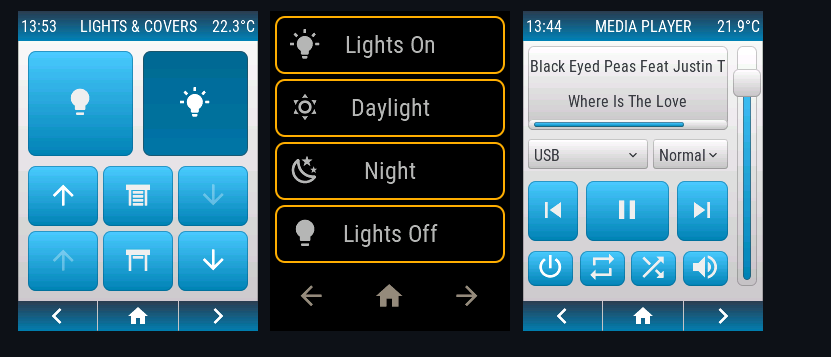
openHASP is an open-source project designed to create customizable home automation user interfaces for devices using the ESP32 microcontroller. It enables users to build and manage control panels for their smart home systems, allowing for seamless integration with various home automation platforms like Home Assistant.
The project aims to provide a user-friendly interface that can be tailored to individual preferences and needs.








